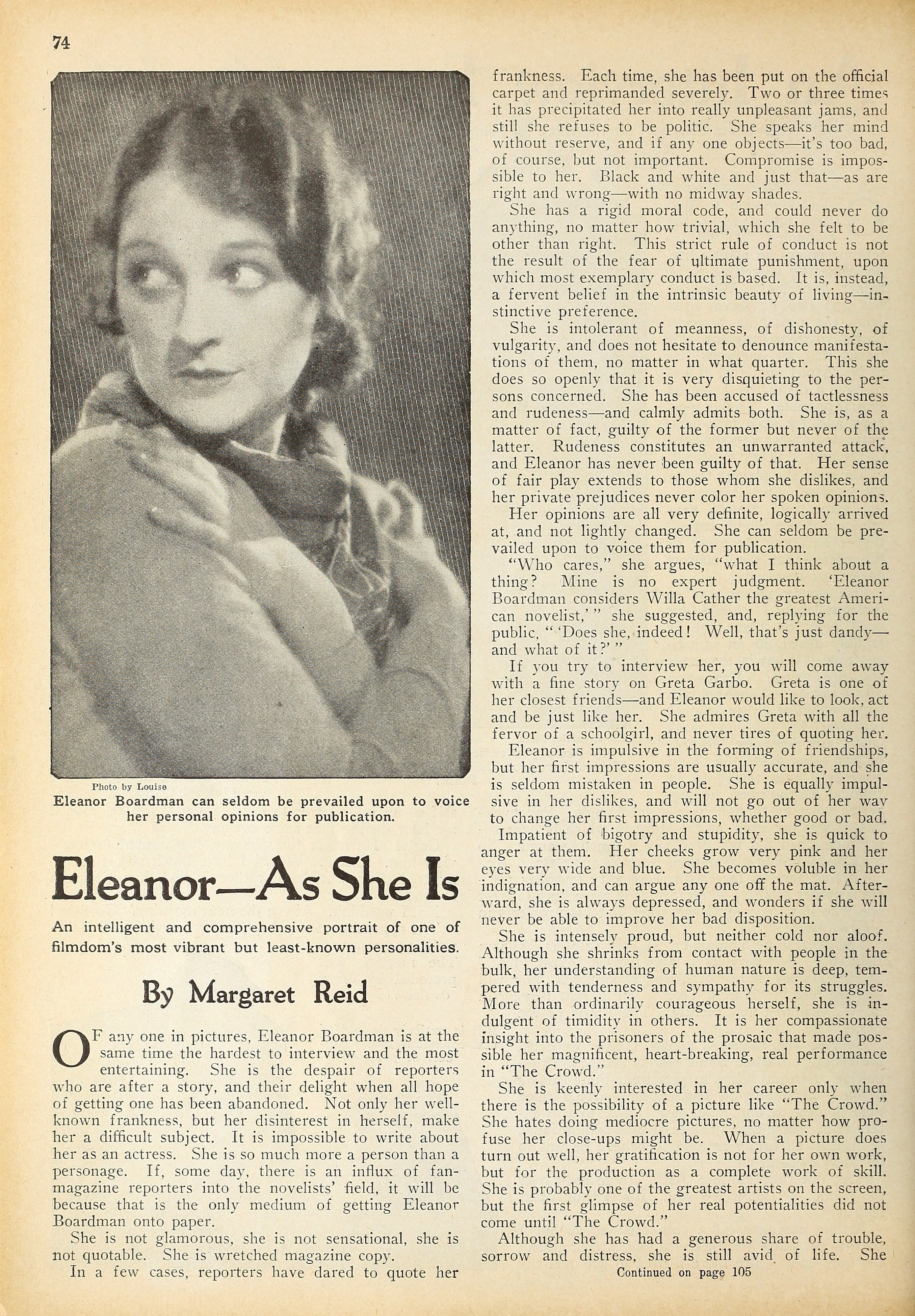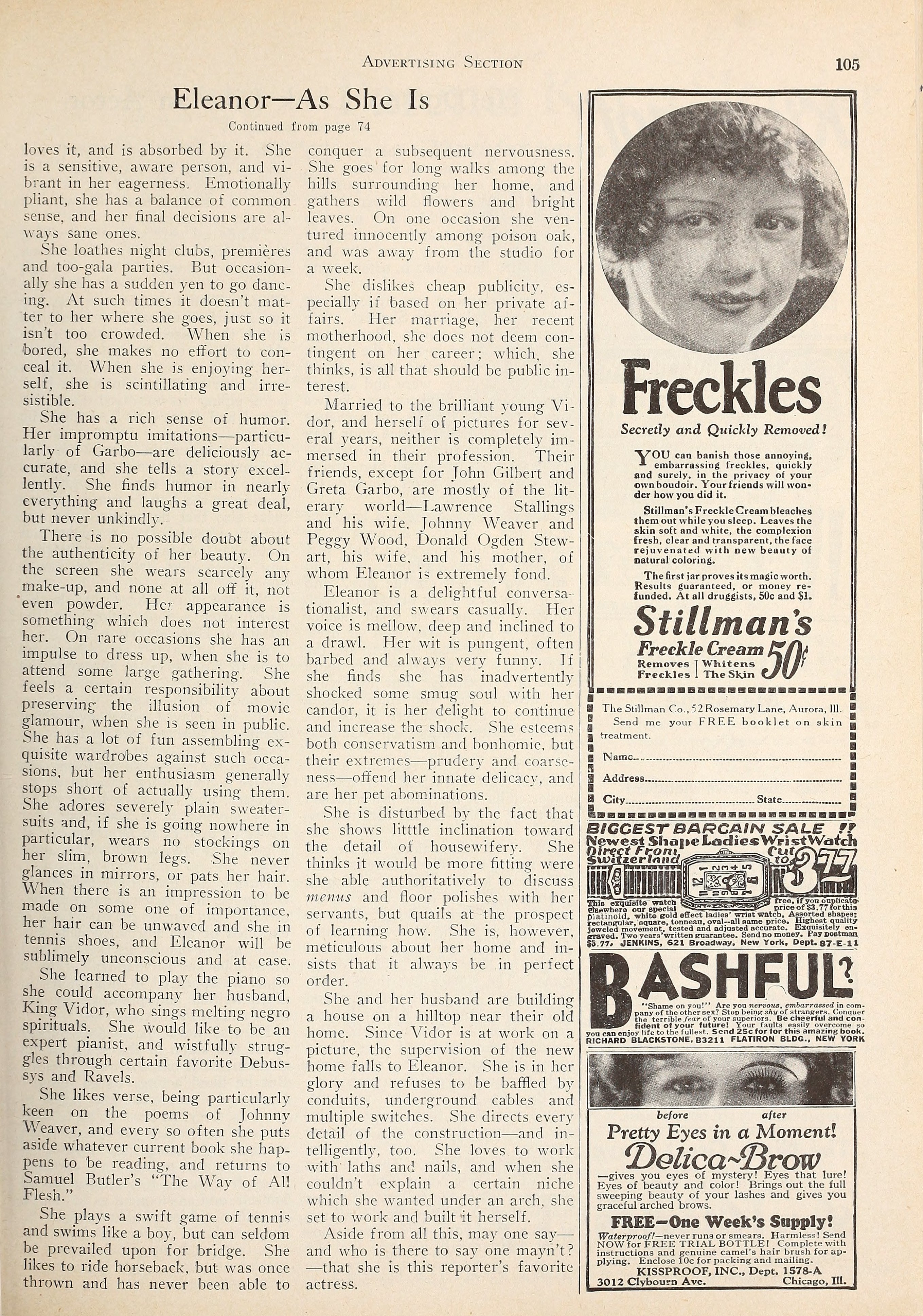Eleanor Boardman — As She Is (1928) 🇺🇸

Of any one in pictures, Eleanor Boardman is at the same time the hardest to interview and the most entertaining. She is the despair of reporters who are after a story, and their delight when all hope of getting one has been abandoned.
by Margaret Reid
Not only her well-known frankness, but her disinterest in herself, make her a difficult subject. It is impossible to write about her as an actress. She is so much more a person than a personage. If, some day, there is an influx of fan-magazine reporters into the novelists’ field, it will be because that is the only medium of getting Eleanor Boardman onto paper.
She is not glamorous, she is not sensational, she is not quotable. She is wretched magazine copy.
In a few cases, reporters have dared to quote her frankness. Each time, she has been put on the official carpet and reprimanded severely. Two or three times it has precipitated her into really unpleasant jams, and still she refuses to be politic. She speaks her mind without reserve, and if any one objects — it’s too bad, of course, but not important. Compromise is impossible to her. Black and white and just that — as are right and wrong — with no midway shades.
She has a rigid moral code, and could never do anything, no matter how trivial, which she felt to be other than right. This strict rule of conduct is not the result of the fear of ultimate punishment, upon which most exemplary conduct is based. It is, instead, a fervent belief in the intrinsic beauty of living — instinctive preference.
She is intolerant of meanness, of dishonesty, of vulgarity, and does not hesitate to denounce manifestations of them, no matter in what quarter. This she does so openly that it is very disquieting to the persons concerned. She has been accused of tactlessness and rudeness — and calmly admits both. She is, as a matter of fact, guilty of the former but never of the latter. Rudeness constitutes an unwarranted attack, and Eleanor has never been guilty of that. Her sense of fair play extends to those whom she dislikes, and her private prejudices never color her spoken opinions.
Her opinions are all very definite, logically arrived at, and not lightly changed. She can seldom be prevailed upon to voice them for publication.
”Who cares,” she argues, “what I think about a thing? Mine is no expert judgment. ‘Eleanor Boardman considers Willa Cather the greatest American novelist,’” she suggested, and, replying for the public, “‘Does she, indeed! Well, that’s just dandy — and what of it?’”
If you try to interview her, you will come away with a fine story on Greta Garbo. Greta is one of her closest friends — and Eleanor would like to look, act and be just like her. She admires Greta with all the fervor of a schoolgirl, and never tires of quoting her.
Eleanor is impulsive in the forming of friendships, but her first impressions are usually accurate, and she is seldom mistaken in people. She is equally impulsive in her dislikes, and will not go out of her way to change her first impressions, whether good or bad. Impatient of bigotry and stupidity, she is quick to anger at them. Her cheeks grow very pink and her eyes very wide and blue. She becomes voluble in her indignation, and can argue any one off the mat. Afterward, she is always depressed, and wonders if she will never be able to improve her bad disposition.
She is intensely proud, but neither cold nor aloof. Although she shrinks from contact with people in the bulk, her understanding of human nature is deep, tempered with tenderness and sympathy for its struggles. More than ordinarily courageous herself, she is indulgent of timidity in others. It is her compassionate insight into the prisoners of the prosaic that made possible her magnificent, heart-breaking, real performance in The Crowd.
She is keenly interested in her career only when there is the possibility of a picture like The Crowd. She hates doing mediocre pictures, no matter how profuse her close-ups might be. When a picture does turn out well, her gratification is not for her own work, but for the production as a complete work of skill. She is probably one of the greatest artists on the screen, but the first glimpse of her real potentialities did not come until The Crowd.
Although she has had a generous share of trouble, sorrow and distress, she is still avid of life. She loves it, and is absorbed by it. She is a sensitive, aware person, and vibrant in her eagerness. Emotionally pliant, she has a balance of common sense, and her final decisions are always sane ones.
She loathes night clubs, premieres and too-gala parties. But occasionally she has a sudden yen to go dancing. At such times it doesn’t matter to her where she goes, just so it isn’t too crowded. When she is bored, she makes no effort to conceal it. When she is enjoying herself, she is scintillating and irresistible.
She has a rich sense of humor. Her impromptu imitations — particularly of Garbo — are deliciously accurate, and she tells a story excellently. She finds humor in nearly everything and laughs a great deal, but never unkindly.
There is no possible doubt about the authenticity of her beauty. On the screen she wears scarcely any make-up, and none at all off it, not even powder. Her appearance is something which does not interest her. On rare occasions she has an impulse to dress up, when she is to attend some large gathering. She feels a certain responsibility about preserving the illusion of movie glamour, when she is seen in public. She has a lot of fun assembling exquisite wardrobes against such occasions, but her enthusiasm generally stops short of actually using them. She adores severely plain sweater-suits and, if she is going nowhere in particular, wears no stockings on her slim, brown legs. She never glances in mirrors, or pats her hair. When there is an impression to be made on some one of importance, her hair can be unwaved and she in tennis shoes, and Eleanor will be sublimely unconscious and at ease.
She learned to play the piano so she could accompany her husband, King Vidor, who sings melting negro spirituals. She would like to be an expert pianist, and wistfully struggles through certain favorite Debussys and Ravels.
She likes verse, being particularly keen on the poems of Johnny Weaver, and every so often she puts aside whatever current book she happens to be reading, and returns to Samuel Butler’s The Way of All Flesh.
She plays a swift game of tennis and swims like a boy, but can seldom be prevailed upon for bridge. She likes to ride horseback, but was once thrown and has never been able to conquer a subsequent nervousness. She goes for long walks among the hills surrounding her home, and gathers wild flowers and bright leaves. On one occasion she ventured innocently among poison oak, and was away from the studio for a week.
She dislikes cheap publicity, especially if based on her private affairs. Her marriage, her recent motherhood, she does not deem contingent on her career; which, she thinks, is all that should be public interest.
Married to the brilliant young Vidor, and herself of pictures for several years, neither is completely immersed in their profession. Their friends, except for John Gilbert and Greta Garbo, are mostly of the literary world — Lawrence Stallings and his wife, Johnny Weaver and Peggy Wood, Donald Ogden Stewart, his wife, and his mother, of whom Eleanor is extremely fond.
Eleanor is a delightful conversationalist, and swears casually. Her voice is mellow, deep and inclined to a drawl. Her wit is pungent, often barbed and always very funny. If she finds she has inadvertently shocked some smug soul with her candor, it is her delight to continue and increase the shock. She esteems both conservatism and bonhomie, but their extremes — prudery and coarseness — offend her innate delicacy, and are her pet abominations.
She is disturbed by the fact that she shows little inclination toward the detail of housewifery. She thinks it would be more fitting were she able authoritatively to discuss menus and floor polishes with her servants, but quails at the prospect of learning how. She is, however, meticulous about her home and insists that it always be in perfect order.
She and her husband are building a house on a hilltop near their old home. Since Vidor is at work on a picture, the supervision of the new home falls to Eleanor. She is in her glory and refuses to be baffled by conduits, underground cables and multiple switches. She directs every detail of the construction — and intelligently, too. She loves to work with laths and nails, and when she couldn’t explain a certain niche which she wanted under an arch, she set to work and built it herself.
Aside from all this, may one say — and who is there to say one mayn’t? — that she is this reporter’s favorite actress.

Eleanor Boardman can seldom be prevailed upon to voice her personal opinions for publication.
Photo by: Ruth Harriet Louise (1903–1940)

Collection: Picture Play Magazine, November 1928
